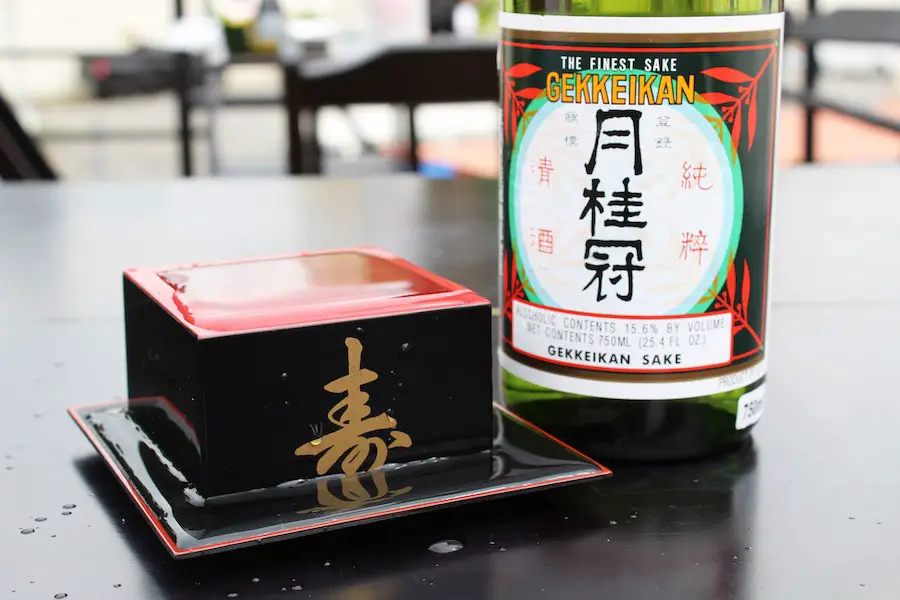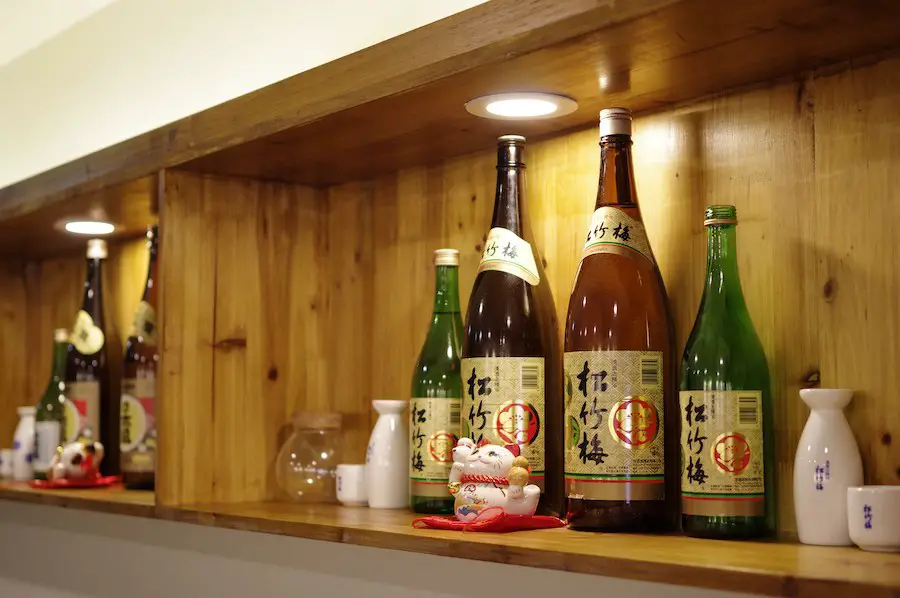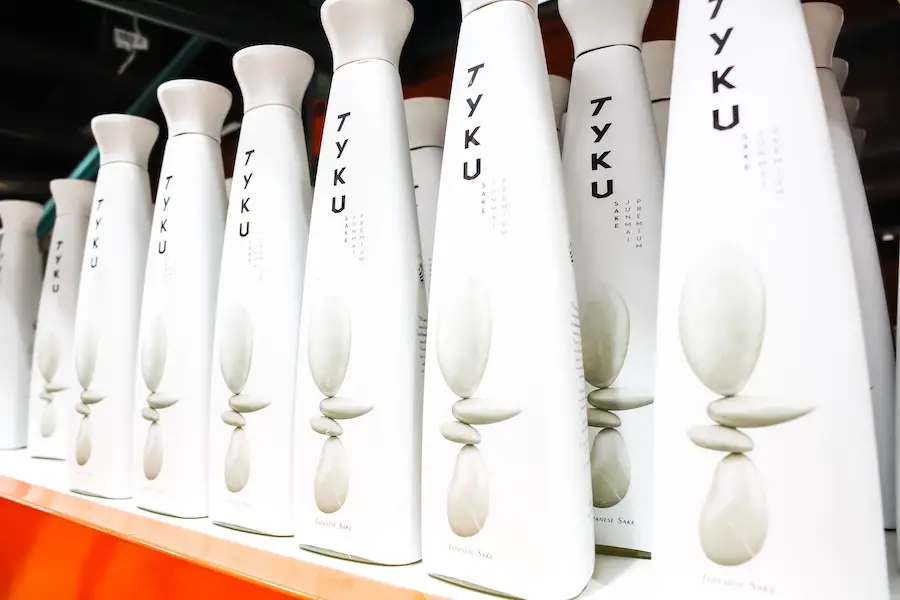Sake is a traditional Japanese alcoholic beverage made by fermenting rice. Generally containing 15% to 20% alcohol, its sweet yet subtle taste goes perfectly with Asian-style dishes, like chicken yakitori or kimchi. Sake is not just a great drink but also an essential ingredient to many Japanese recipes. However, there is always an important question for folks with celiac or gluten sensitivity like me: is sake gluten-free?
Is sake gluten-free?
As always, the short answer is that it depends, although most “premium” sake is gluten-free. In this article, I will explain why some sake brands are not safe for people with gluten sensitivity, and how to find gluten-free ones.
First, I want to start by laying out the four basic ingredients of sake: water, rice, yeast, and koji. As you probably know, the first three–water, rice, and yeast–are naturally gluten-free. The last ingredient, koji, can contain gluten depending on the circumstances. Koji is a type of fungus that people use as a fermentation starter, sometimes growing on food with gluten. For example, some miso uses barley-based koji and is not gluten-free. However, luckily for us sake lovers, koji in sake is always rice-based! In other words, all four main ingredients are naturally gluten-free.
Then what makes certain sake not gluten-free? Some contains additional ingredients, such as flavoring, sweetener, alcohol, or additives, which might contain gluten. Luckily, there is a very detailed labeling scheme for sake based on its ingredients and brewing process. Accordingly, if we look into different “types” of sake, we can figure out whether a specific bottle of sake contains gluten. Here are some tips to help you find gluten-free sake!
Bottom line: Four main ingredients of sake are always gluten-free. What makes some sake not gluten-free is its additional ingredients.
Tip 1: Stay away from Futsushu
Futsushu (ordinary sake) is a table-wine version of sake. While providing good value to your kitchen, futsushu often includes ingredients with gluten in them. These ingredients allow sake makers to produce affordable bottles. Unfortunately, they make futsushu inadequate for people seeking gluten-free sake. So, if a bottle has terms like “raspberry flavor,” you are probably in the futsushu land.
Another way to spot futsushu is to look for a Japanese sake grading system on the label. On the labels of tokutei meisoshu (premium sake), there will be grading designations like junmai or honjozo. These terms indicate the types of ingredients and specified brewing processes. Therefore, it is easier for us to understand exactly what is in the bottle of tokutei meisoshu. On the other hand, futsushu will not have any grading term on its label. I will explain the meaning of these gradings below!
Bottom line: Stay away from bottles with flavor, or without Japanese grading designations. Those bottles are probably futsushu that possibly contain gluten.
Tip 2: Look for the word “Junmai”

Junmai is a Japanese word for “pure rice.” It means that the bottle contains only the four main ingredients that are naturally gluten-free! Some bottles will just say junmai, while others may have other designations like tokubetsu junmai. These additional phrases point to different rice polishing ratio or brewing process. As long as the label has the term junmai, the bottle should have only the four gluten-free ingredients. So, bottles that say junmai ginjo, junmai daijinjo, or tokubetsu junmai are safe to drink as well!
Of course, there are other types of premium sake that is likely gluten-free. For example, honjozo is a type of sake that has added distilled alcohol. The University of Chicago Medicine explains that all liquors are gluten-free, because the distilling process removes gluten. However, Beyond Celiac and other celiac-related organizations warn that some grain-based liquors possess a risk of cross-contamination. During the aging, bottling, and transportation process, distilled liquor may be exposed to gluten. Therefore, if you feel anxious about drinking something that potentially include alcohol distilled from gluten-containing base, you should stick to junmai.
Bottom line: Junmai label shows that the bottle only contains rice, water, yeast, and koji–all naturally gluten-free.
Tip 3: Look for “gluten-free” sake label
Fortunately, some sake makers explicitly advertise their products as “gluten-free!” This means that these products satisfy the FDA labeling requirement, making them safe to drink. Here is a list of gluten-free sake brands that are readily available at most grocery or liquor stores!
Gekkeikan Traditional

Gekkeikan’s website states that Gekkeikan Traditional is both sulfite and gluten-free. Being the world’s most popular junmai, Gekkeikan Traditional has a clean, well-balanced taste. I love it for its versatility! You can use it while cooking, or you can drink it chilled, room-temperature, or warm. Another advantage of Gekkeikan Traditional is its availability. As a domestic sake, you can find Gekkeikan Traditional almost anywhere. It has a relatively affordable price point as well, at around $8 per bottle.
Sho Chiku Bai Classic Junmai

According to its official website, Sho Chiku Bai Classic Junmai is both sulfite and gluten-free. Grocery stores near me do not carry this brand, but you can purchase it online. Sho Chiku Bai Classic Junmai is another affordable one at around $7 per bottle; the price point makes pouring it into a sauce much easier! If you want to explore more, you can find non-junmai bottles that are gluten-free on the website.
Tyku Junmai

Tyku Junmai is another good option with a higher price point at around $25 per bottle. They are readily available at local grocery or liquor stores, which I love! Moreover, all types of sake by Tyku are gluten-free. So, if you want to try flavored sake, Tyku is an excellent choice. I love the cucumber flavor–it is a perfect refreshing drink for a summer day.
Bottom line: There are several sake with “gluten-free” labels, which indicates that the products meet the “less than 20 ppm” requirement of the FDA.
Conclusion on gluten-free sake
Most premium sake is naturally gluten-free. Tokutei meisoshu mostly use five gluten-free ingredients: rice, water, yeast, koji, and distilled alcohol. However, distilled alcohol sometimes possesses a risk of cross-contamination. If you want to be safe, look for the bottles with the term junmai on them. Junmai is a special designation for bottles that contain only rice, water, yeast, and koji. If you want to be completely stress-free, look for “gluten-free” lables, which are regulated by the FDA.
I hope this article has been helpful! If you love Asian cooking like me, here are some articles that you might find interesting:
- Korean Barbecue Dipping Sauces
- Dakjuk: Korean Chicken Rice Porridge
- Doenjang Jjigae: Korean Soybean Paste Stew
- Chicken Yakitori: Japanese Chicken Skewers
- Korean Thanksgiving Meal
If you are looking for other gluten-free drinks, there is a fantastic article by GlutenBee that lists several different gluten-free drinks! I highly recommend checking it out.
Carving A Journey is a participant in the Amazon Services LLC Associates Program, an affiliate advertising program designed to provide a means for sites to earn advertising fees by advertising and linking to Amazon.com. Although we may earn commissions for our endorsement, recommendation, testimonial, and/or link to any products or services from this website, these opinions are my own and I fully support these products.


2 comments
Fantastic roundup of gluten free sake! I am going to have to try these, especially the more traditional pure rice variations. I have tried Tyku Junmai in the past and it is great. 🙂
They are definitely worth checking out! Thank you so much!